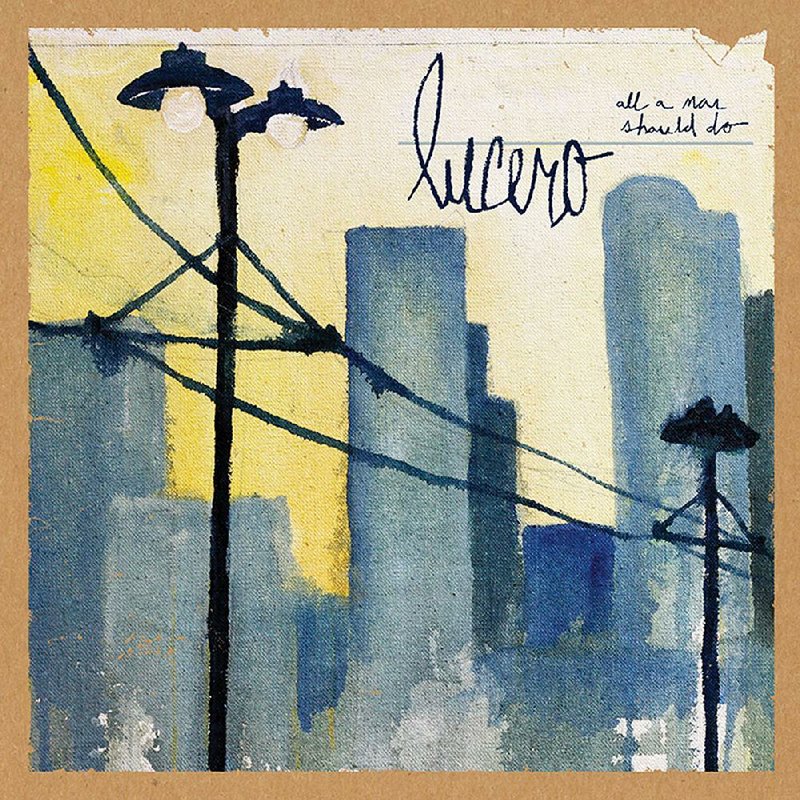The new Lucero album, All a Man Should Do, doesn't exactly start with a bang. It's more of a slow burn. The first three songs -- the midtempo "Baby Don't You Want Me," the image-laden "Looking for Warren Zevon's Los Angeles" and the mournful "The Man I Was" -- are bathed in acoustic shades of hazy amber and evoke the light and long shadows of a fading fall afternoon.
There's a reflective tone that culminates by the fifth track, the gorgeous and regret-filled ballad "Woke Up in New Orleans."
"These aren't the songs a 22-year-old would write," says Lucero frontman and Little Rock native Ben Nichols. "They are definitely written from an older man's perspective."
The gravelly voiced Nichols, 41, has been writing songs and playing guitar for Lucero since starting the band with guitarist Brian Venable in Memphis in 1998. Over nine studio albums, one EP and last year's raucous two-disc set Live From Atlanta, Lucero has carved a niche that began with ragged alt-country on classic albums like Tennessee, The Attic Tapes and That Much Further West and evolved into its own strain of Memphis-infused, Southern rock 'n' soul on 1372 Overton Park, Women and Work and the EP Texas and Tennessee.
In addition to Nichols and Venable, the band includes keyboardist Rick Steff, drummer Roy Berry, bassist John C. Stubblefield, saxophonist Jim Spake and new member Randy Ballard on trumpet.
For All a Man Should Do, the third consecutive album the band has recorded with producer Ted Hutt, Nichols says the group took its foot off the accelerator just a tad.
"This is the first Lucero record where I played acoustic guitar exclusively," he says. "That kind of automatically gave the record a more subdued sound. Everybody in the band played with a lighter touch, and I eased back on the vocals a bit. That's something we had never tried. In the past, we've been pretty bombastic and loud." It's also the sound he has had in his head for quite a while now.
"This is the record I would have loved to have recorded when I was 15," Nichols says, and to that end he was listening to early R.E.M., Crowded House and The Church while working on the album.
Nichols' songs rarely stray from chronicling some combination of heartbreak and bars, whiskey and women and stories from his life. On the new album he stares down the barrel of adulthood, personal change and responsibility, and doesn't blink, singing, "I'm not going back again/I'm not the man I was back then" on "The Man I Was." Later, on the viciously catchy anthem "Young Outlaws," he revels in hanging up his guns and settling down.
The raw emotion of "Woke Up in New Orleans," with its subject of regret and possible redemption, may be the album's strongest moment.
"It's tricky finding stuff that is important enough to put down on paper and sing about," Nichols says. He was home in Memphis briefly before catching a flight for a show with Lucero in Philadelphia that included Social Distortion. "We've got a ton of songs and you don't want to repeat yourself, but the subject matter is familiar territory -- drinking too much, bad relationships, good relationships. It's still very personal stuff."
A good example is "Looking for Warren Zevon's Los Angeles," a melancholy tour of that city inspired by the great songwriter Zevon and the dissolution of a relationship that left Nichols in tatters.
"I was dating a girl in Los Angeles and she put me through the ringer," he says. "I'm a big Warren Zevon fan and while I was out there, I found myself listening to more of his stuff and looking for the places he mentioned in his songs. The funny part is that in that song, I mostly mention the places where I always hung out."
The mood of All a Man Should Do, which will be released on ATO Records on Friday, begins to shift about halfway through, with the shuffling Memphis soul of "Throwback No. 2" and the aforementioned "Young Outlaws." (When the band played "Outlaws" in July at the Peacemaker Festival in Fort Smith the crowd went nuts for the new track. It's similar to the bright, upbeat "On My Way Downtown" from Women and Work and is sure to become a fixture in Lucero's live sets.)
"This record definitely has an arc to it," says Nichols, who has done soundtrack work for his younger brother Jeff, director of the films Mud, Take Shelter and Shotgun Stories.
The earlier tracks stem from that period of difficulty in his life, but the latter songs reflect "a transition from a darkness to actually becoming a bit more satisfied with where I am with relationships and life in general. It goes into a more positive light."
It also has a cover song with Memphis roots. The penultimate track is a sweet reading of Big Star's simple ode "In Love With a Girl." The band plays it straight, but injects enough of that loose, torn-flannel Lucero personality into the classic to make it its own.
"We rearranged it a bit," Nichols says. A line from the song is also where the album gets its title.
That track, like the album and the two preceding full-length records, was recorded at Ardent Studios in Memphis, where Big Star recorded its three classic albums in the '70s. Big Star drummer Jody Stephens even stopped by on occasion and, along with Ken Stringfellow and Jon Auer, who now play in Big Star with lone surviving member Stephens, sang harmony on the song. Nichols was still in awe of the musical gathering that was captured.
"Having Big Star sing on your cover of a Big Star song that you're recording at Ardent Studios -- it doesn't get much more exciting than that," he says.
Style on 09/15/2015

